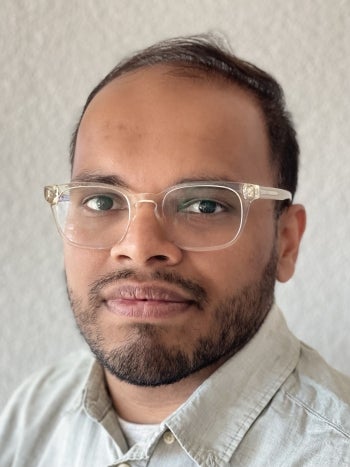New ASU professor investigates marine microbiomes
Glen D'Souza has recently joined ASU’s School of Molecular Sciences (SMS) and the Biodesign Center for Fundamental and Applied Microbiomics (CFAM) as an assistant professor. D’Souza’s research focuses on microbial communities or microbiomes broadly, which are basically assemblages of bacteria that live together in different environments.
So far D’Souza is focused on the microbiomes of marine environments. His Microbial Ecosystems Lab investigates how microbial communities and their functions are affected by climate change, and leverages intercellular interactions to design communities to fulfil specific functions.
“ The bacteria I study do a good job for the planet,” explains D’Souza. “When we look at planet Earth from above or from satellite images most of it is blue because the water is blue but if it was not for marine bacteria interacting with algae and continually degrading algal polysacccharides, it would be green.”
Many bacterial species contribute to the degradation of polysaccharides but they leave a lot of polysaccharides floating around. Other bacteria can degrade these polysaccharides. We need to figure out why in order to stop our oceans from being pretty messy. D’Souza’s lab in the Biodesign Institute will work on the bacterial communities that degrade these polysaccharides and specifically ask how different groups of organisms degrade them.
D’Souza explains that if he obtains five liters or a gallon of ocean water and looks at the polysaccharides and at what kind of bacteria are contained in the sample there's typically three groups of bacterial species or three phenotypes present. There are the ones that can degrade the polysaccharides, as they have the enzymes to break them down. Next there's the ones that cannot do anything and are just hanging out waiting for the other group to do something as they use the degraded polysaccharides. They are called exploiters or scavengers.
D'Souza works on understanding how the degraders degrade these polysaccharides and how the scavengers influence the degradation process.
Using techniques including bacterial genetics, experimental evolution, and single-cell approaches such as microfluidics and high-throughput microscopy, D’Souza seeks to uncover the principles governing the emergence of metabolic interdependencies among bacterial cells and populations. His recent work demonstrates how bacteria can transition between solitary and collective growth modes depending on nutrient availability, providing insights into the ecological roles of these behaviors in nature.
D’Souza’s ultimate goal is to understand how interactions drive ecological and evolutionary dynamics of microbial communities that impact biogeochemical process crucial for planetary health as well for health of humans and animals. His lab’s research develops general principles underlying the functioning of microbial communities by studying model systems and natural marine communities from disparate environments.
D’Souza’s pioneering research has profound implications for our understanding of microbial communities' impact on ecosystems, human health, and disease. By examining the metabolic dependencies that arise in microbial populations, he aims to illuminate the evolutionary processes that have shaped these interactions. His approach combines advanced investigative techniques with theoretical insights, promising to significantly advance knowledge in the field of microbiomics.
As D’Souza explains, CFAM and SMS constitute a strong community of microbiologists, ecologists, computational biologists and biochemists. “If your interests align with ours and you want to work together to explore the myriad of interactions that define microbial communities, reach out for a chat. We would love to hear from you!”


